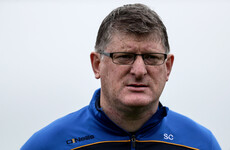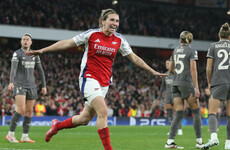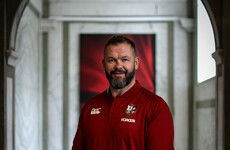FOR A TEAM that has adopted a mantra of ‘no excuses’, the slogan used to publicly portray the togetherness of the group in the face of obstacles and ultimately define what they stand for over a period of unparalleled success, Craig Fulton is keen to ensure he doesn’t break it here.
In a shock announcement, Fulton, the Ireland hockey head coach, last week revealed he is to step down from his position later this month to take up an assistant coach role with the Belgium national team, just five months out from Ireland’s first World Cup appearance in 28 years.
The timing of his departure has left many perplexed and disappointed, particularly when the South African had extended his contract with Hockey Ireland until after Tokyo 2020, and the loss of an individual who has single-handedly hauled the organisation and national team from a nadir to rarefied heights during his four years in charge represents an unquantifiable setback.
Hockey Ireland CEO Jerome Pels admitted Fulton’s resignation came as a ‘complete surprise’, leaving many to instantly assume frustrations over funding, a lack of resources, the organisation’s incompetency to secure commercial partners and an unsustainable high-performance model had boiled over, and ultimately reached a tipping point.
But, in truth, it was only a matter of time before one of the top nations came calling for Fulton’s services given the remarkable job he has done with Ireland, and in this case, the opportunity to work with Belgium — ranked third in the world — and within a full-time, professional system, proved one offer too good to turn down.
This is the part Fulton is keen to make clear, because having instilled a ‘no excuses’ ethos within the squad during his time at the helm, an approach and attitude which saw Ireland defy all odds by making history to qualify for the Rio Olympics under his tutelage, it is important for him to lay out the reasons for his decision.
Firstly, he had no desire to leave his current position having been involved in Irish hockey for the last decade and having settled in Dublin with his young family, who moved from South Africa shortly after his appointment to the top job in 2014.
Six weeks ago, Fulton was approached by the Belgian Hockey Association with the offer of becoming their assistant coach to Shane McLeod, following the departure of Philippe Goldberg from the national team set-up.
It left him with a considerable decision to make, and he had to make it quickly.
“It was hard,” he says. “I had to think about it, but didn’t have a lot of time.”
As is always the way, there were pros and cons. He had committed himself to Hockey Ireland, setting out a vision to take the Green Machine to November’s World Cup in India and then to Tokyo in 2020, building on the success the team had achieved during the last Olympic cycle.
This was his team, he had worked tirelessly to change the culture, improve the structures and lobby for more support, and had overseen a period of remarkable growth, as Ireland went from their lowest ebb to the top 10 in the world rankings in the space of four seminal years.
The problem was that the position in Belgium had to be taken almost immediately, and there was no option to wait and move after the World Cup at the end of the year, forcing him into an undeniably difficult situation where the only way of furthering his own coaching career and ensuring further financial support for his family was to leave Hockey Ireland.
“The full-time programme side of it, that appeals to me from a Belgium perspective,” Fulton explains to The42.
“I’ve been trying for quite a long time to turn the Irish environment into a semi-professional environment or get more blocks of time together and it’s difficult, because it’s not that easy to do that in Ireland but that’s not an excuse.
“I’m not making an excuse for why I’m leaving, that’s not it at all, because I’m really proud of what we’ve done considering everything. We’ve knocked off a lot of big teams who have far greater resources than us so that’s not it at all. It’s just that if I need to develop, I need to get into that space and learn all about it to make me a better coach.
“I only have a small window of opportunity as an international coach.”
The bottom line was that Fulton, for all his team’s success and ‘positive’ meetings with Government ministers, was never given the resources to match his ambitions, even when Ireland qualified for the Olympics.
He has always insisted the lack of resources was not a frustration or deterrent, rather an everyday reality which proved to be making of the squad’s enviable spirit and driving force behind the relentless crusade to punch consistently above weight and upset the established order.
It has always been a struggle and even before and after Rio, the situation didn’t change with Fulton and the squad forced to spearhead fundraising campaigns to ensure they had the necessary resources to underpin a basic high-performance programme.
Qualification for this year’s World Cup, Ireland’s first since 1990, has presented similar problems and while Sport Ireland funding has increased marginally — augmented by a special grant of €60,000 — Fulton is still operating off scraps and trying to prepare his players, the majority of whom either work or study during the week, to compete against the best of the world on a part-time basis.
“It’s not an excuse mindset at all,” he says. “We’ve had way less than a lot of the big teams and we’ve knocked them off in recent years and that’s always been the way. I wouldn’t walk out on it now because of those problems, why would I? That’s not the reason and it’s not an excuse. That’s not it at all.
“But you’re trying to run two high-performance programmes [men and women, who have also qualified for the World Cup] at that level and the resources are pretty limited. It’s unsustainable for a group of players who are full-time working and full-time playing.
“It’s just the reality in Ireland. It’s not in the mainstream, it’s making good ground, but it’s not on TV, and the men’s team can’t even get a sponsor. How does that work?
“I’m not really sure what it is because of a lot of people can align with the values of the team, do you know what I mean? And those values are teamwork, accountability and leadership. A lot of businesses strive on those so I’m not really sure where the miss is but when you kind of look at what is out there on TV from a sporting perspective, it’s GAA, football, rugby and now cricket and if you’re not in the TV space on an international level, you don’t stand a chance of getting partnerships.
“Ireland might go and win the [Hockey] World Cup and do something unbelievable and people will go ‘well, I like it but I’m not going to get involved in it’ and I don’t know why that’s the case.
“It is what it is, and it’s not frustration, it’s just reality. We’ve dealt with that from the start and overcome everything. The fact that the guys have done phenomenally well and we’ve gone from 15th to ninth in the world, shows we haven’t used any excuses.”
It’s clear that Fulton, despite the limitations within Hockey Ireland and all the challenges associated with running a professional high-performance programme on an amateur footing, is reluctant to leave.
Nobody could blame him for moving on with the feeling that he has done enough for Irish hockey and brought them to the highest level possible under the current system, but that isn’t the case at all, because his insatiable appetite for betterment meant he was always striving for more.
“I wanted to take this team to the World Cup and win,” he states emphatically. “I wanted to make Ireland a top-eight side, and they can still achieve that, and I wanted to go to Tokyo with Ireland. That was what I envisaged.”
That Fulton, a two-time Olympian during his own decorated playing career with South Africa, heads for pastures new lamenting the fact he will not be in a position to bring Ireland to the World Cup, or a second consecutive Games does a better job of emphasising the impact he has had than anything else.
Having come to Ireland to play and coach with Pembroke Wanderers, he then took his first step on the international coaching ladder as assistant to Paul Revington between 2006 and 2009, before being appointed head coach in 2014, instantly stating his intentions to end a 107-year wait and bring Ireland to Rio.
At the time, it was a bold and far-fetched vision to lay out for an organisation which was ultimately on its knees, counting the costs of two failed Olympic qualification campaigns, the fallout from which resulted in key personnel leaving the set-up.
“When I came in, it was a broken system, I had to push for change,” he says.
Easier said than done, but Fulton knew something had to give, and after the heartbreak of missing out on London 2012, he looked to channel the anger and frustration into something positive.
A fresh start, a forward-looking attitude, a winning mentality.
A ‘no excuses’ mantra.
He explains: “Like anything you’re trying to break the mould and you swim upstream, and that was my job. I had to push for change in a system that was trying to do more than it could do and a system which was on the borderline of breaking point. It didn’t have a lot of funding or resources but we got everything out of it. It doesn’t always work out the way you want it to but the results are there to prove it can work.”
It took time, but sometimes things need to crash and burn to be rebuilt again and Fulton recognised that, marking the agonising defeat to Korea in Belfield as the low point and using it as the reference point for the turning of the tide.
“There are some unsung heroes who kept it alive in those dark years, they kept the flag flying and I was fortunate enough when David Harte gave me a phone call and said would you please apply for the job,” he continued.
“It took about a year to get everyone aligned and cast a vision of what we were trying to do to actually qualify. 2012 was devastating for everyone and 2013 and 2014 wasn’t the best but we had to be patient. No one really knew how to think or what way to take it.
“It was actually the perfect time to come in as I could put the structures in place and shape it and create the belief I wanted. We beat England not too long after that, the first time in 11 years, at UCD [June 2014] and then everyone knew, we’re not actually far away. It kicked on nicely from that.”
2015 was the year the Irish men’s hockey team broke the glass ceiling, as they continued on a steep upward curve under Fulton by winning bronze at the European Championships and then sealing qualification for Rio, becoming the first Irish team from any sport to compete at the Olympics since 1948.
It was a far cry from when Fulton had taken a little over a year previous, as Ireland jumped from 24th to 12th in the world rankings and dragged themselves from the wilderness despite all of the barriers to success which had existed, and still do.
While the vision, belief and against-all-odds approach created an even stronger bond within the group, it was Fulton’s international experience which saw him best utilise the resources he had at his disposal to engender the confidence required to bridge the gap and bring the game’s powerhouses to their knees.
“Both the players and coaches sacrificed a lot,” the 43-year-old continues. “We had to debrief a few things and just take the emotion out of it, and just get down to it and recognise what we needed to improve on.”
A lot of hard work was involved, and for Fulton — who started the position by commuting to and from South Africa every few weeks before moving over full-time — he went above and beyond the remit of a head coach, fighting tooth and nail for Hockey Ireland to give him the financial backing he desperately craved.
But just as he was beginning to unlock the full potential of the group, Fulton threatened to abandon the job and walk away in protest.
He recalls: “There was one time [I nearly quit]. I think it was October/November 2014 in a French series and I had put in a request to take the team to South Africa in January for a camp as we had not had a longer period together than three days.
“For us to qualify for the Olympics, we needed to spend at least 10 days together and play tough opposition so there was a request for this trip and it was denied and I basically said if this is denied and doesn’t go through, I resign, I hand in my resignation.
“Fortunately about a week later, they [Hockey Ireland] reconsidered and the training camp was back on. I was very serious about it because that was the catalyst for us to find out where we were against the teams we’d be playing in the qualifiers and it worked. It really helped us, it put us on the map and the rest is history.”
From there, Fulton masterminded a transformative chapter for the organisation, not only driving the success of the men’s team but creating widespread belief within the Irish hockey fraternity that anything could be achieved with the right attitude and application.
There was no limit to what the team could achieve in Fulton’s eyes and with his ingenuity and ambition at the forefront, the bar had been set high leading into the World Cup campaign, with Ireland recently completing a series win over Germany in Dublin.
“There are a lot of good people that are in the system who have helped push on it and have helped me steer and shape it.
“The plan is in place to still kick on, we have a world-class staff now, we have a psychologist that has come in for the first time in three years, and we have unbelievable coaching staff.
“All the partners that support Hockey Ireland need to keep going and put in even more resources to sustain it. That’s the big key, if they keep doing that then Hockey Ireland with the platform that it’s got at the moment, will go from strength to strength.
“But need to be ambitious. My challenge is, what does it matter if Ireland get top eight in the world? What will change? At what point does it change? And I’ve never really been given that answer. So if we get top eight, top six, top five in the world, are we still an amateur programme? I’m not sure there’s a grand plan and I don’t know at what point it will change, that people will recognise it has to change.”
Now, that’s no longer Fulton’s responsibility, or problem.
His sole focus is on the upcoming series against France in Cork, which will bring the curtain down on a memorable and groundbreaking era in Irish hockey, led by a softly-spoken, but determined and visionary, South African.
“There are a lot of highlights,” he smiles.
“You remember the highs and the lows, and there have been many of both. We want to finish strong as there’s lots of work to do against France and in the build-up to the World Cup.
“I’m quite confident the guys will give a fantastic showing against France but at the same time it’ll be extremely difficult [for me to say goodbye]. I’m staying in international hockey so I’ll be watching and following Ireland play, it just changes now that I’m employed by a different federation, but I’ll never lose sight of the friendships and we’ll always stay in contact.
“Lots of good memories made.”
Some journey, some impact, and what a legacy he’ll leave behind.
The42 is on Instagram! Tap the button below on your phone to follow us!















He’s right to go for it.
He has to think of his future.
Nobody is indispensable ok
Best of luck Craig.
Great article, really sums up the impact someone like Ned has had. He’ll be missed!
Shame to see Irish hockey lose such a driving force at a critical time. It’s also a shame that the sport in general can’t find the financial backing or the requisite exposure. Such a fast, exciting and technically skilful game.
Any time I talk to people from other sports who see hockey for the first time, they always comment on the pace, fitness and skill required at the highest level. These athletes deserve a better shot at competing on the big stage, their recent successes and achievements prove that.